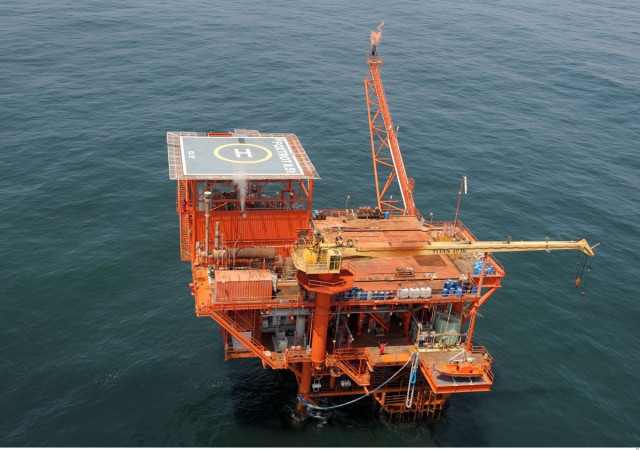ECC allows Turkish firm to work on stalled offshore exploration block
Oil, gas field has drill-ready prospects to be pursued by a new consortium

The Economic Coordination Committee (ECC) on Tuesday allowed a Turkish firm to operate an offshore exploration block and extended the licence period of the zone.
Pakistan Petroleum Limited (PPL) is the operator of the offshore block, but it has failed to start work for the last four years. Consequently, the ECC permitted Turkish Petroleum Overseas Company (TPOC) to kick off work on the Eastern Offshore Block-C.
The ECC approved PPL's request for assigning participating interests in the block – a significant milestone in Pakistan's offshore exploration efforts. Under the new arrangement, the participating interests will be held by TPOC with a 25% share, PPL with 35%, Mari Energies with 20% and Oil & Gas Development Company (OGDC) with 20%.
This will bring international offshore operating experience to Pakistan's exploration landscape and is expected to enhance technical capabilities, operational efficiency and overall project delivery. The block contains drill-ready prospects, which will be pursued by the consortium.
The exploration well is expected to attract substantial foreign investment to Pakistan's offshore sector, reinforcing the government's commitment to deepening reliance on indigenous energy resources. In the event of success in drilling, additional opportunities in the area will be prioritised, ultimately contributing to Pakistan's resource base and long-term energy security.
This development aligns with the government's recent award of 23 offshore blocks to various exploration and production (E&P) companies, including the members of this consortium. With ECC's approval, the consortium is set to advance preparations for drilling operations.
The proposals submitted to ECC for approval included an extension in phase-II of the Eastern Offshore Indus Block-C by 36 months, effective from July 1, 2025 in accordance with Rule 26(1) of Offshore Rules 2023.
The Petroleum Division said that the state-owned company's consent may be granted to allow the transfer of 66% participating interest to different entities in accordance with Rules 73, 76 and 81.
It sought approval for the pricing of oil, condensate and gas, which would be governed by the 2012 policy for all future discoveries in the block subject to PPL's compliance with financial and regulatory obligations under the 2012 policy and Offshore Rules 2023. The pricing mechanism will take effect following execution of a supplemental agreement to ensure the removal of any conflict between the two policies and rules.
The ECC was informed that the government of Pakistan had also been engaged with friendly countries such as China, Azerbaijan and Turkey to encourage their companies to participate in oil and gas sector activities.
Pursuant to the prime minister's visit to Turkey in May 2023, a high-level delegation of the Turkish Petroleum Corporation, along with a company having expertise in offshore drilling, visited Pakistan. During the trip, Turkish experts reviewed the offshore geological and geophysical data. After a series of meetings, Turkish Petroleum and Mari Energies showed interest in participating, along with PPL, in the Eastern Offshore Indus Block-C.
The block was earlier awarded to Government Holdings Private Limited (GHPL) and is currently being operated by Zaver Petroleum Corporation on behalf of GHPL. The PPL board considered proposals from TPAO, OGDC and Mari Energies, and to mitigate the high-risk nature of offshore exploration, it recommended the assignment of participating interests to those investors.
The exploration licence for the Eastern Offshore Indus Block-C had expired in June 2025. Consequently, GHPL forwarded a PPL's request for extension by 36 months in phase II.
Justifying the request for extension, PPL referred to the work done in the block, ie, successful reprocessing of 1,000 km of 2D and 400 square km of 3D seismic data, along with horizon inclusion and interpretation. PPL commissioned a third-party evaluation with Apsenor Management of the UK, which is expected to be completed by February 2026. The outcome of this study will guide the decision on carrying out 3D seismic acquisition and drilling of wells.
PPL also conveyed its acceptance of all financial and regulatory obligations under the 2012 policy and Offshore Rules 2023. Accordingly, the Petroleum Division sent a reference to the Law & Justice Division, seeking legal opinion relating to the interpretation of the Petroleum Policy 2012.
The Law Division confirmed that the pricing of oil, condensate and gas would be governed by the 2012 policy for all future discoveries in the block, subject to PPL's compliance with financial and regulatory obligations. This position was supported by GHPL's letter dated June 10, 2025, whereby it conveyed that pricing mechanisms under the 2012 policy would take effect upon execution of a supplemental agreement.



















COMMENTS
Comments are moderated and generally will be posted if they are on-topic and not abusive.
For more information, please see our Comments FAQ